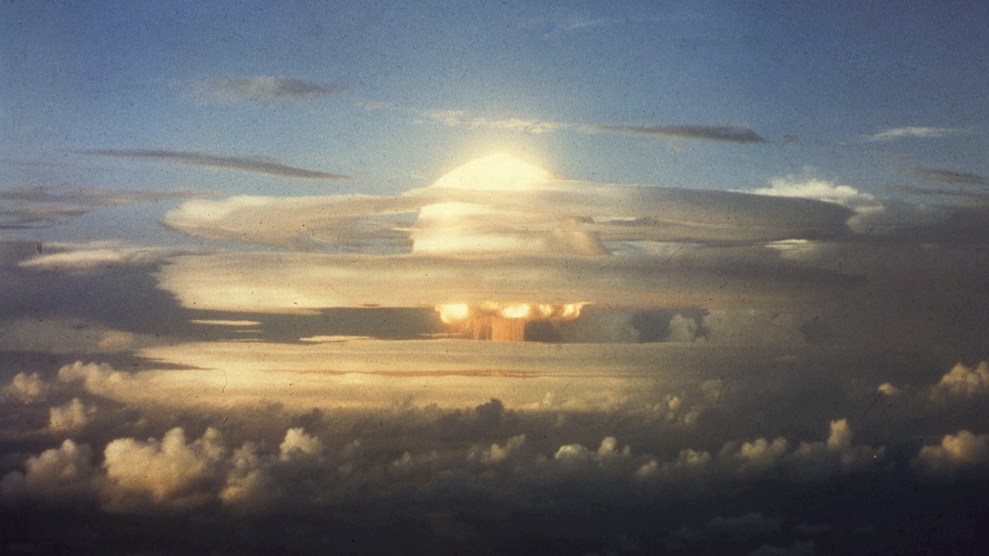
Mother Jones illustration; Paul Sancya/AP; Getty
Donald Trump’s Republican Party platform, released in July, contains little in terms of tangible policy proposals.
But one of the few concrete ideas is a call to (apologies for the capitalization) “PREVENT WORLD WORLD III” by building “A GREAT IRON DOME MISSILE DEFENSE SHIELD OVER OUR ENTIRE COUNTRY”—a plan that experts say is nearly impossible to execute, unnecessary, and hard to even comprehend.
Trump has vowed to build this Iron Dome in multiple speeches. It is among his campaign’s 20 core promises. The former president has said that the missile shield would be “MADE IN AMERICA,” creating jobs, as well as stopping foreign attacks.
An expert called Trump’s Iron Dome idea “the insane ramblings of a senile old person.”
While it might sound nice to talk of building the “greatest dome of them all,” as Trump recently said, Jeffrey Lewis, a missile expert at the Middlebury’s James Martin Center for Nonproliferation Studies, says such a plan is ridiculous.
“It’s dramatically unclear to me what any of this means,” Lewis said of the Iron Dome idea, “other than just treating it like the insane ramblings of a senile old person.”
It may be more useful to consider an American Iron Dome as a bombastic businessman’s branding exercise, rather than a viable policy position, said Lewis: “The Iron Dome here has just become a kind of brand name, like Xerox or Kleenex for missile defense.”
The Iron Dome, a short-range missile defense system created by Israeli state-owned company Rafael Advanced Defense Systems and American weapons manufacturer Raytheon, has been a prized part of the country’s military arsenal since it became operational in 2011. It is not, as the name suggests, an impenetrable shield. It’s more mobile: when a short-range missile reaches Israel’s airspace, “interceptor missiles” are launched to blow them up before they can touch the ground.
The Iron Dome’s functionality depends on Israel’s comparatively miniscule size and proximity to enemies. This makes it particularly hard to imagine a similar setup in the US, which is over 400 times the geographical size of Israel. Such an apparatus, national security analyst Joseph Cirincione estimated, would cost about 2.5 trillion dollars. That’s over three times the country’s entire projected military budget for 2025.
Such a system would also be unnecessary. As of now, there are no armed groups sending missiles toward the United States from within a theoretical Iron Dome’s 40-mile interception range. Such a system “couldn’t even protect Mar-a-Lago from missiles fired from the Bahamas, some 80 miles away,” Cirincione wrote in late July.
America’s pre-existent missile defense network, which has been in place since the Bush administration, is currently made up of 44 interceptors based in California and Alaska, geared towards longer-range missiles, such as those that could be fired from North Korea. But the system has performed abysmally in tests, despite Republicans generally claiming “it works,” said Lewis. (Groups like the right-wing Heritage Foundation have been calling for increased missile defense funding since at least the 1990s.)
“This is why it’s so hard to make heads or tails of what Trump is saying,” Lewis continued. “Is Trump saying the system in Alaska doesn’t work? Is Trump saying that Canada is going to develop artillery rockets to use against North Dakota?”
















